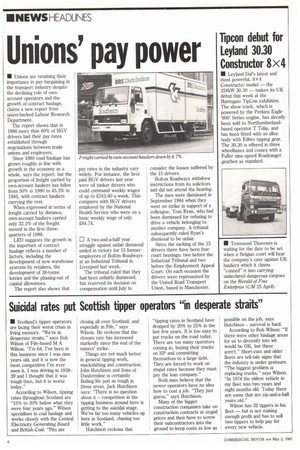Suicidal rates put Scottish tipper operators "in desperate straits"
Page 8

If you've noticed an error in this article please click here to report it so we can fix it.
• Scotland's tipper operators are facing their worst crisis in living memory. "We're in desperate straits," says Bob Wilson of Fife-based M A Wilson. "I'm 64, I've been in this business since I was nine years old, and it is now the most competitive I've ever seen it. I was driving in 193839 and I thought that it was tough then, but it is worse today."
According to Wilson, tipping rates throughout Scotland are "15% to 20% below what they were four years ago." Wilson specialises in coal haulage and works closely with the Central Electricity Generating Board and British Coal. "Pits are closing all over Scotland, and especially in Fife," says Wilson. He reckons that the closure rate has increased markedly since the end of the miners' strike.
Things are not much better in general tipping work, muckshifting and construction. John Hutchison and Sons of Dunfermline is certaintly finding life just as tough in those areas. Jack Hutchison says: "There is no question about it – competition in the tipping business around here is getting to the suicidal stage. We've far too many vehicles up here in Scotland, chasing too little work."
Hutchison reckons that "tipping rates in Scotland have dropped by 20% to 25% in the last five years. It is too easy to put trucks on the road today. There are too many operators coming in, buying their trucks on HP and committing themselves to a large debt. They are forced to work on stupid rates because they must pay the loan company."
Both men believe that the newer operators have no idea how to cost a job. "They just guess," says Hutchison.
Many of the bigger construction companies take on construction contracts at stupid prices and then have to screw their subcontractors into the ground to keep costs as low as possible on the job, says Hutchison – survival is hard.
According to Bob Wilson: "If there were other haulage areas for us to diversify into v.it would be OK, but there aren't." Short-cuts and older fleets are tell-tale signs that the industry is under pressure. "The biggest problem is replacing trucks," says Wilson. "In 1974 the oldest vehicle in my fleet was two years and eight months old. Today there are some that are six-and-a-half years old."
Wilson has 32 tippers in his fleet — but is not making enough profit and has to sell two tippers to help pay for every new vehicle.




























































































































